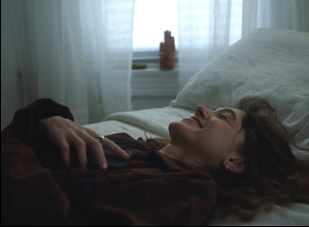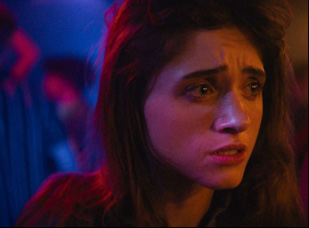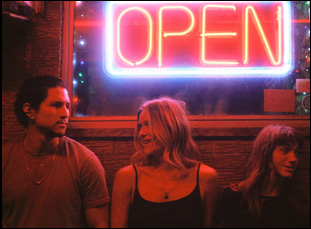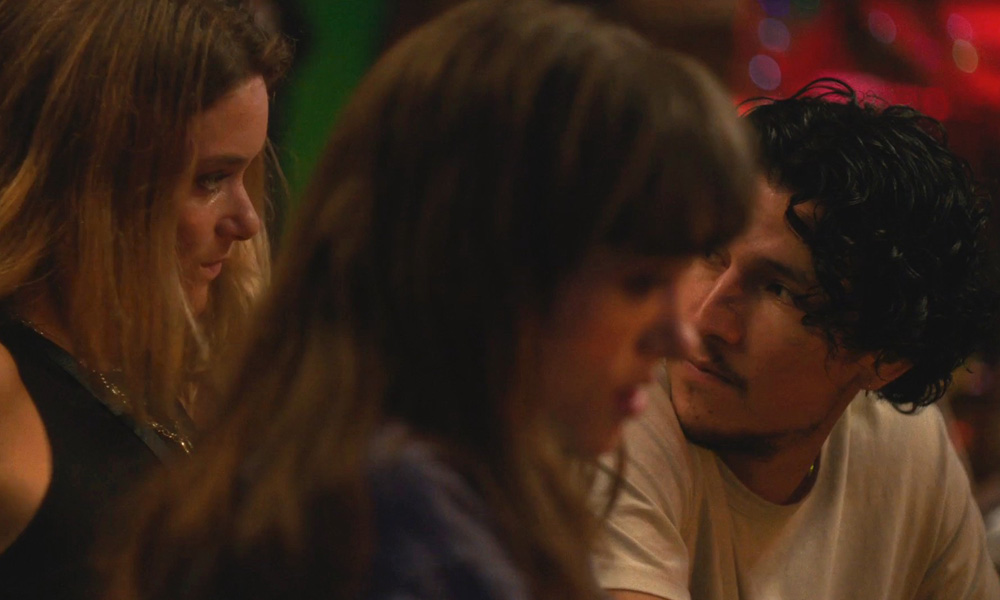There’s a sense that Annie (Natalia Dyer) is stuck in “Chestnut,” caught between places when she’s spending her last summer in Philadelphia before moving out to Los Angeles, between professional pursuits when she started out as a finance major and left with plans to become a poet and eventually between people when she meets Tyler (Rachel Keller) and Danny (Danny Ramirez) drowning her sorrows at a bar and the two, who work in hospitality, whisk her away to an underground pub where those in the business head after hours. Her eyes gravitate towards Tyler, whose attention can be fleeting, as her longtime friend Danny confides, “I wouldn’t overthink things with her,” but her mind races when there appear to be romantic possibilities with both, creating choices that like all the other aspects of her life can feel paralyzing when any decision feels like it could last forever.
Writer/director Jac Cron is considerably wiser in observing Annie in her post-collegiate chrysalis in her engaging feature debut, employing a continually moving camera to express the swirl of life around her that she’s careful to put any hooks in just yet and where her passions may be at any given time. While someone place their hand on hers or offering a kind word may initially give her pause at such a moment of uncertainty, Cron captures the flood of emotion that follows to the excitement of experiences she’s never had to the danger of being in uncharted territory. It may be lazy few months in the city she grew up in with no obligations to speak of, but from the moment that Tyler asks, “Where’d you come from?” the film makes the most of Annie’s anxious energy, whether in waiting for her life to begin or worrying about how certain things will end and while she’s looking to be jolted from her stasis, Cron is cannily conscious of how Annie also interrupts the lives of others as she threatens to drive a wedge between Tyler and Danny.
As the trio hops from one bar to another in the twilight hours, Cron makes it worth sticking around to take in the moment that “Chestnut” captures so vividly, grabbing something ephemeral from the air as Annie looks for a little direction in her life amidst others who are also still searching and making the feeling of being lost a little less lonely. There is a tenderness to the night in the filmmaker’s evocation of where she came of age herself attending college in the City of Brotherly Love, and while Annie has to wrestle with whether any of her relationships is an actual romance, there is no question of what the place itself is offering her as she takes steps towards spreading her wings where comfort can be found in unexpected corners. With “Chestnut” now offering such a refuge in theaters across the country following its premiere last year at Frameline, Cron recently spoke to us about an auspicious feature debut that “came together in 100,000 different ways,” staying attuned to the emotion of any given scene in its camerawork, and how bringing together a production for a summer in the city fed into the fabric of the film.

Honestly, it ebbs and flows. I have been a night owl at different points in my life, definitely more in my younger years closer to college age, um, but I think also it’s fueled by moments in my life where I want to like go out and explore and connect with different types of people and sometimes when I am feeling more in a creative zone, but I’m a little older now and I have a partner, so I find myself being a little more of a a morning person. I still enjoy going out. I think it just is in a different capacity, more like I’m grabbing a drink and having a deep meaningful conversation with a friend for a few hours.
There’s a great bar crawl element to this, and I understand the title is a reference to a street in Philadelphia. Did the geography actually inform the structure of the film?
Yeah, Chestnut Street runs through the gayborhood in Philly, so I would spend a lot of time in that area [when I was in college], especially because I had just come out like a year or two before that. I also lived at the time on Chestnut Street, but in a different area [since] that street runs through the entirety of the city, so I think it’s an ode to Philadelphia, [but the title is also] derived from the movie [being] centered around writing and poetry and “Chestnut” is a word that, if you look for it, comes up in almost every literature book. It’s something that I’ve noticed the more I read, like “There it is!” So those two conjunctions is how the name came to be.
Rachel Keller was in your short, but how did she and Natalia Dyer come to mind to play these characters?
I was so lucky. I could not have asked for better people just as themselves, but also as actors. They were really truly perfect for these roles. Rachel and I had met through mutual friends and [after] we started becoming friends, I was like, “Do you have any interest in doing a short film with me” and she was really down. We filmed it all in my house that I lived in at the time and it was very low-key. We just had so much fun doing it together that afterwards, she [said], “I would love to see what else you’re thinking about working on” and I gave her the script for “Chestnut.” She [said], “I would love to be in this if you like haven’t cast anyone yet,” and at the time, I didn’t have representation and her manager really championed “Chestnut” from the beginning. Rachel and Natalia shared an agent at the time, and I’d been a fan of “Stranger Things” and I’d seen some interviews with Natalia and her personality just felt very akin to this character, so she was my first choice and I told her [agent], “I want Natalia Dyer” and they set up a like a two-hour coffee [where we] hit it off.

“Finding the emotion” is a phrase that my cinematographer Matt Clegg and I actually used the whole shoot. I just kept repeating, “What’s the emotional crux of the scene?” and we circled around that. My mentor Drake Doremus is very much in that camp of trying to film as naturalistically as possible, almost doing improv with the camera. Trying to drop in and sneak up on those emotional moments is what allowed us to find a lot of those surprise parts of each scene. A lot of it wasn’t planned. We built a shot list out and made sure we got all those, but within those we always had time for exploration and then on top of that, we would just have one shot where it’s just “find the emotion” and I would just let Matt go. I would [say to the actors], “Okay, the camera is going to be moving throughout and you guys just focus on what you’ve been doing all this time and we’ll do a medium close-up and just have Matt follow you around and find those diamond moments.
The lighting is also quite evocative, which might be complicated when you’ve got a lot of movement like that – was this tricky to stage?
Our lighting team was incredibly impressive and really technical at their jobs at a level that I hadn’t yet worked with, so it was an amazing learning experience for me. We often set up our lights to set the whole scene with more focused lighting for our hero shots and close-ups to make those moments pop, but [here] we just really tried to set the atmosphere as much as we could because we did want to have some freedom in moving around the characters. It also really helped that since it was all set at night, a lot of lights were not overly bright or too powerful in any one direction, so when you’re sitting at a bar, [for instance] you’re not going to see a spotlight on a person. You’re going to have homogenous lighting in the whole scene, so it’s going to be dark and gritty and your eyes are not adjusted. And then we got to add some fun things like in the club scenes when the strobes flashed and the light hit the actors’ faces in certain ways, we really got to play with like emotion. Some of that was planned, but some of that was magic as film sets always have.
Was there anything that happened that you may not have expected, but made it into the film and you like about it now?
There’s so much I think because the script was all written out, but I was very open to what [the actors were] feeling in the moment because you never know what could be used later — some shocking things that I could have never written because everybody brings something different and it’s a collaborative process.
What’s coming to my mind in particular is the club scene where Danny [Ramirez], Rachel and Natalia are dancing and when Rachel sees Danny looking at Natalia being kind of jealous and [she] catches that look in his face and turns and the red strobe light hits her face at that very moment that she turns and it flashes, it almost is like a a visual representation of the anger and dismay that she that she felt. We weren’t in control of the strobe lights — it just happened and she was in the correct position because that was a scene that Matt was trying to find the emotion in and after that, Rachel moves to the back of the club and she is just standing there, holding her hair off of her neck as a girl would do if she was really sweaty. I didn’t tell her to do that. It was a physical choice that she made that I would have never thought of asking her because it’s like when you’re acting in that moment, you are feeling it in your body and I’m sure there was something in her body that she felt she had to take the hair off the back of her neck and it just broke my heart. It was a moment where I was like, “Wow, this person is just trying to get some relief and she doesn’t know what to do. She’s overwhelmed.” It was a physical response that I thought was so cool.
Your producer Lizzie Shapiro had suggested that filming in Philadelphia in the summer, as these characters experience in the film, might’ve fed into a little transference from the feeling of making it to what eventually made it on screen. What was it like?
I think if you ask anyone who goes on location for a film, it was like summer camp. We were all staying in the same little strip of Fishtown in Philadelphia, which if you’ve ever been is a bit like Brooklyn with two streets of bars and restaurants so you’re kind of seeing everybody out and about on the off days. We were all very close. It was a small crew and the closest transference, to use your verbiage, was that on the weekends, we were going out and I was showing people like nightlife and I think they got to experience “Oh yeah, this is the movie we’re making, we’re in it.” Philadelphia has one of the best dive bar cultures, so it was such a joy for me to show everybody that and they could live what I already lived and I don’t have to explain as much. I could just be like, “Here, we went out last night. Now we’re shooting this scene and you guys know how it feels. Let’s recreate the magic.”

Yeah, it just drags you in. [laughs]
Not to suggest this was more autobiographical than where you set it, but it must be interesting to have a feeling of accomplishment when you’ve made your first feature with all the decisiveness that entails while looking at these characters where that’s elusive. What’s it like to capture that kind of moment and put it in the rearview?
Why I hope it resonates with a lot of people is that obviously I don’t think everybody’s going through some sort of pseudo love triangle with different people at once, but I do think that feeling of “what’s right for me? Should I be here? Am I in the right place? Am I hanging out with the right people?” do crop up at any age. felt that way during filming at certain points and I feel certain ways about that now. They’re pretty universal feelings not just when you’re young and in that time of life, but there are always things that you look back and you’re like, “What if I did this way? What if I felt more this way when I was doing that?” And I think I’m a person that’s always really aware of my emotional state or I try to be, and there are moments where we’re not able to be as connected emotionally to ourselves as we would like to be. That definitely causes some feelings of loss or strife within ourselves, so while I do feel accomplished [having made this], it comes a lot of mixed feelings. Every step you take up the staircase is going to bring different issues and I feel like I relate to all of the characters [in “Chestnut”], just at different times in my life. They’re all versions of myself.
“Chestnut” opens on June 21st in limited release, including New York at the Quad Cinema, Los Angeles at the Landmark Westwood and NoHo 7, Atlanta at the Plaza, Chicago at the Alamo Drafthouse Wrigleyville, Columbus, Ohio at the Gateway Film Center and Santa Ana, CA at the Frida. A full list of theaters and dates is here.




